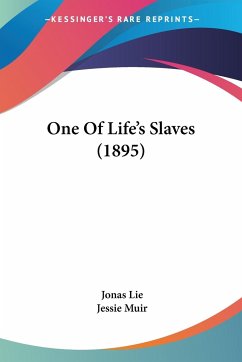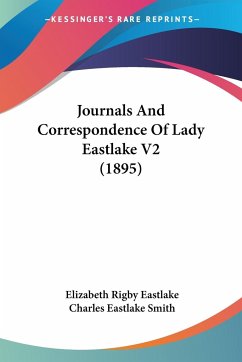
Jonas Lie
Broschiertes Buch
One Of Life's Slaves (1895)
Versandkostenfrei!
Versandfertig in 1-2 Wochen

PAYBACK Punkte
11 °P sammeln!




This scarce antiquarian book is a facsimile reprint of the original. Due to its age, it may contain imperfections such as marks, notations, marginalia and flawed pages. Because we believe this work is culturally important, we have made it available as part of our commitment for protecting, preserving, and promoting the world's literature in affordable, high quality, modern editions that are true to the original work.
Jonas Lie (1833-1908) was a prominent Norwegian author known for his novels, short stories, and poems that often explored the social, cultural, and psychological aspects of Norwegian life. He is considered one of the great Norwegian writers of the 19th century, alongside Henrik Ibsen, Bjørnstjerne Bjørnson, and Alexander Kielland. Lie initially practiced law, but he soon turned to writing, inspired by the cultural and literary movements of his time. His early works were influenced by his experiences in Northern Norway and his legal career. His first major literary success came with "Den Fremsynte" (The Visionary) in 1870, a novel that combined folklore and realism, exploring the lives and superstitions of the people in Northern Norway. Lie's works often depict the struggles of ordinary people, focusing on themes such as family, social injustice, and the clash between traditional and modern values. He is known for his psychological insight and his ability to create complex characters. The Visionary" (1870): This novel, blending folklore with realism, marked Lie's breakthrough and established him as a significant literary figure. "The Family at Gilje" (1883): A domestic novel that explores the lives of a family in rural Norway, examining issues of gender roles, education, and societal expectations. "One of Life's Slaves" (1883): A social realist novel that critiques the harsh working conditions and social injustices faced by factory workers during Norway's industrialization. "The Commodore's Daughters" (1886): A novel about the lives and struggles of women in a maritime family, highlighting issues of gender and social mobility.
Produktdetails
- Verlag: Kessinger Publishing, LLC
- Seitenzahl: 188
- Erscheinungstermin: 17. Oktober 2007
- Englisch
- Abmessung: 229mm x 152mm x 10mm
- Gewicht: 282g
- ISBN-13: 9780548625439
- ISBN-10: 0548625433
- Artikelnr.: 23453051
Herstellerkennzeichnung
Libri GmbH
Europaallee 1
36244 Bad Hersfeld
gpsr@libri.de
Für dieses Produkt wurde noch keine Bewertung abgegeben. Wir würden uns sehr freuen, wenn du die erste Bewertung schreibst!
Eine Bewertung schreiben
Eine Bewertung schreiben
Andere Kunden interessierten sich für











